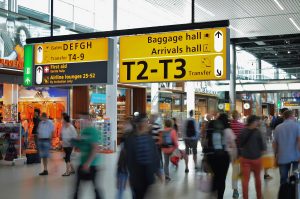
What is the difference between a delay attributable to the company and a case of force majeure (e.g. weather, strike)?
Every year, thousands of Canadian travellers have their plans turned upside down by the cancellation of their flights. When this disappointment occurs, the distinction between a delay attributable to the airline and a case of force majeure becomes crucial… and often a source of confusion.
In the vast skies of air travel, turbulence is not confined to unpredictable air pockets; They also take the form of disruptions in flight schedules. The latter may emanate either from the direct liability of the airline, or from external events qualified as force majeure. Understanding this difference is essential for affected passengers, as it determines their rights and potential compensation.
Delay attributable to the company
When a flight is cancelled for reasons that are within the direct management or control of the airline, we are talking about a delay attributable to the airline. These reasons include, but are not limited to: unplanned technical maintenance; errors in crew planning; or internal operational issues.
In these cases, the airline is usually held liable… It must therefore offer certain compensation to affected passengers (according to the Air Passenger Protection Regulations). These can be refunds, rerouting, or even financial compensation.
Travelers should be aware that each company has its own cancellation policy. However, they are all subject to federal standards that dictate a minimum framework of rights for passengers.
Force majeure
On the other hand, a case of force majeure refers to an exceptional and unforeseeable situation… such as capricious weather; a surprise strike at air traffic control; or other external events that are beyond the reasonable control of the airline.
In these extraordinary circumstances, the company is not held responsible for any inconvenience suffered by its customers. As a result, the compensation offered is often more limited and focuses on assistance rather than financial compensation.
It is important for the traveller to be informed that although frustrating, these events are considered inevitable and allow airlines to invoke a waiver clause from the usual obligations to their passengers.
Passenger rights
Canada has the Air Passenger Protection Regulations (APPR), which clearly define the rights of travellers in the event of cancellations or long delays. The APPR make a clear distinction between situations attributable to carriers and those resulting from force majeure.
The Regulations stipulate that in the first scenario, passengers are entitled to certain standards of treatment: accommodation if necessary; meal; access to communications; and financial compensation according to the time served. In the event of force majeure, however, while the aid is still provided, it does not go so far as to include monetary compensation.
Travelers should always check their rights before departure… in order to be fully informed and prepared for any eventuality that may disrupt their itinerary.
Procedure in case of cancellation
What to do when your flight is cancelled? The procedure varies depending on the type of cancellation. In any case: stay calm; Contact your airline immediately to find out your options. and keep all your documents related to the flight (tickets, confirmations, etc.).
If the cancellation is due to an event attributable to the company: insist on knowing your specific rights under the APPR. If it is a case of force majeure: find out about the logistical assistance offered by your carrier (temporary accommodation; meals). It is also wise… even crucial… Purchase comprehensive travel insurance that covers both scenarios to cushion the potential financial impact of unforeseen cancellations.
Prevention and recommendations
The best defense against the unexpected is good preparation. Check the status of your flight regularly before you leave; Purchase adequate insurance. Familiarize yourself with your company’s specific cancellation policy.
Also keep in mind that even if some situations are beyond human control (“force majeure”), there is always a channel to express your concerns or complaints to the carrier or via the Canadian Transportation Agency (CTA).
Finally… Be patient and flexible. Travel has its share of hazards, but with knowledge and preparation: it remains an invaluable source of adventure and discovery! Summarize:
Type of situation | Common examples | Company Responsibility | Rights and possible set-offs | Conditions / Important Notes |
Delay attributable to the company | – Unplanned maintenance- Crew planning errors- Internal operational issues | ✅ Yes (direct liability) | – Refund or rerouting required- Monetary compensation (up to $1,000 CAD if late arrival)- Accommodation, meals, communications | Supervised by the RPPA; applicable if flight operated by aircraft ≥ 30 seats and excluding safety reasons. |
Force majeure | – Extreme weather conditions- Air traffic control strike- Medical emergency on board- Political instability | ❌ No (Financial Liability Waiver) | – Basic assistance only (meals, drinks, accommodation if needed)- No monetary compensation | The company is not required to pay financial compensation; Obligation of logistical assistance only. |
Procedure in case of cancellation | — | Obligations by cause | – Contact the company immediately- Keep tickets and proofs- If attributable to the company: request RPPA rights- If force majeure: ask for assistance | The CTA may be referred to in the event of a dispute or non-compliance with the minimum obligations. |
Prevention | — | — | – Check the carrier’s specific policy- Take out travel insurance covering both scenarios- Track the status of the flight before departure | Prepare a plan B and know the useful contacts (company, insurance, OTC). |


